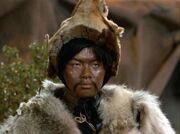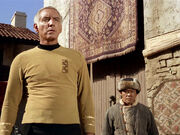Pseudohuman (talk | contribs) (expanded the kukulkan note) |
|||
| (6 intermediate revisions by 3 users not shown) | |||
| Line 1: | Line 1: | ||
| − | [[ |
+ | [[File:Genghis_Khan.jpg|thumb|The original [[Genghis Khan|Khan]]]] |
| − | [[ |
+ | [[File:Mao Zedong.jpg|thumb|Party Chairman Mao, seen in the [[time stream]]]] |
| − | [[ |
+ | [[File:RayTsingtao.jpg|thumb|Federation citizen Ray Tsing in 2268]] |
| − | [[ |
+ | [[File:Tracey_and_Wu.jpg|thumb|[[Prime Directive]]-violating captain and Omega IV native]] |
The term '''Chinese''' refers to anything originating from the [[Earth]] [[country]] of [[China]]. |
The term '''Chinese''' refers to anything originating from the [[Earth]] [[country]] of [[China]]. |
||
| + | The Chinese were one of the civilizations visited by the [[alien]] being [[Kukulkan]] in the ancient past. The alien creature influenced Chinese [[architecture]] and [[agriculture|agricultural]] development. Kukulkan told the Chinese to build a city, and when it was finished he would return. The Chinese only incorporated some of the designs into their architecture, such as the gateways and many [[dragon]] symbols, and never completed the energy amplification system that was supposed to signal Kukulkan. Kukulkan faded into mythology and was remembered as the [[Chinese dragon]]. ({{TAS|How Sharper Than a Serpent's Tooth}}) |
||
| − | While visiting ancient Earth, the [[alien]] [[Kukulkan]] portrayed serveral creatures of ancient legends, including a [[Mayan]] [[god]], the [[Toltec]]s' [[Quetzalcoatl]], the [[Chinese dragon]], among others. ({{TAS|How Sharper Than a Serpent's Tooth}}) |
||
| + | |||
| + | {{bginfo|The Kukulkan visit was not given a specific date but the accounts would seem to suggest an era around [[Distant past#Thousands of years ago|5,000 BC to 2,000 BC]].}} |
||
Chinese philosopher [[Sun Tzu]] wrote ''[[The Art of War]]'' in the [[1st millennium BC|4th century BC]]. ({{TNG|The Last Outpost}}; {{ENT|Divergence}}) |
Chinese philosopher [[Sun Tzu]] wrote ''[[The Art of War]]'' in the [[1st millennium BC|4th century BC]]. ({{TNG|The Last Outpost}}; {{ENT|Divergence}}) |
||
| Line 14: | Line 16: | ||
In [[2371]] [[Harry Kim]], asked by Captain [[Kathryn Janeway|Janeway]] about [[Neelix]]'s [[food]], recited the ancient Chinese curse "''May you live in interesting times.''" ({{VOY|The Cloud}}) The [[2372|following year]], when [[Tom Paris]] was sharing his feelings about [[Kes]], Kim recited "an old Chinese expression" which stated, "''stay out of harm's way.''" In response, Paris told Kim that "''that's not a Chinese expression,''" to which Kim replied, "''if it works, use it.''" ({{VOY|Parturition}}) |
In [[2371]] [[Harry Kim]], asked by Captain [[Kathryn Janeway|Janeway]] about [[Neelix]]'s [[food]], recited the ancient Chinese curse "''May you live in interesting times.''" ({{VOY|The Cloud}}) The [[2372|following year]], when [[Tom Paris]] was sharing his feelings about [[Kes]], Kim recited "an old Chinese expression" which stated, "''stay out of harm's way.''" In response, Paris told Kim that "''that's not a Chinese expression,''" to which Kim replied, "''if it works, use it.''" ({{VOY|Parturition}}) |
||
| + | |||
| + | Answering [[Neelix]] question who built the [[Great Wall of China]]. Kathryn Janeway answered "the Chinese" in [[2375]]. ({{VOY|11:59}}) |
||
== Individuals of Chinese descent == |
== Individuals of Chinese descent == |
||
| − | * [[Harry Kim]] |
||
* [[Mao Zedong]] |
* [[Mao Zedong]] |
||
* [[Sun Tzu]] |
* [[Sun Tzu]] |
||
| Line 29: | Line 32: | ||
== Background == |
== Background == |
||
The writer's guide for ''[[Star Trek: Voyager]]'' stated that Harry Kim (like actor [[Garrett Wang]] who played him) was of Chinese ancestry, which may be the source for his mentions of Chinese proverbs, but he himself was not an inhabitant of China – it was later revealed that his family resided in [[South Carolina]]. |
The writer's guide for ''[[Star Trek: Voyager]]'' stated that Harry Kim (like actor [[Garrett Wang]] who played him) was of Chinese ancestry, which may be the source for his mentions of Chinese proverbs, but he himself was not an inhabitant of China – it was later revealed that his family resided in [[South Carolina]]. |
||
| + | |||
| + | It should be noted that the name "Kim" is common amongst Koreans. |
||
== External link == |
== External link == |
||
| − | *{{wikipedia}} |
+ | * {{wikipedia}} |
[[Category:Earth groups]] |
[[Category:Earth groups]] |
||
Revision as of 19:16, 2 June 2012

The original Khan
Party Chairman Mao, seen in the time stream
Federation citizen Ray Tsing in 2268

Prime Directive-violating captain and Omega IV native
The term Chinese refers to anything originating from the Earth country of China.
The Chinese were one of the civilizations visited by the alien being Kukulkan in the ancient past. The alien creature influenced Chinese architecture and agricultural development. Kukulkan told the Chinese to build a city, and when it was finished he would return. The Chinese only incorporated some of the designs into their architecture, such as the gateways and many dragon symbols, and never completed the energy amplification system that was supposed to signal Kukulkan. Kukulkan faded into mythology and was remembered as the Chinese dragon. (TAS: "How Sharper Than a Serpent's Tooth")
Chinese philosopher Sun Tzu wrote The Art of War in the 4th century BC. (TNG: "The Last Outpost"; ENT: "Divergence")
After having traveled through the Guardian of Forever to 1930 New York City, Spock and James T. Kirk were caught by a NYPD officer stealing clothes off a clothesline. When Kirk observed that the officer had noticed Spock's unusual appearance, Kirk attempted explained that "my friend is obviously Chinese." During a further attempt to explain Spock's ears, Spock reminded Kirk of "the unfortunate accident I had as a child," to which Kirk explained to the officer, that Spock "caught his head in a mechanical rice picker. But fortunately, there was an American missionary living close by who was actually a, skilled plastic surgeon in civilian life." The officer did not buy the story, and Kirk and Spock took off running with their stolen clothes. (TOS: "The City on the Edge of Forever")
In the Federation era the Tsing Tao family, of Chinese descent, took part in the first expedition to Triacus; only the son Ray survived. (TOS: "And the Children Shall Lead")
In 2371 Harry Kim, asked by Captain Janeway about Neelix's food, recited the ancient Chinese curse "May you live in interesting times." (VOY: "The Cloud") The following year, when Tom Paris was sharing his feelings about Kes, Kim recited "an old Chinese expression" which stated, "stay out of harm's way." In response, Paris told Kim that "that's not a Chinese expression," to which Kim replied, "if it works, use it." (VOY: "Parturition")
Answering Neelix question who built the Great Wall of China. Kathryn Janeway answered "the Chinese" in 2375. (VOY: "11:59")
Individuals of Chinese descent
- Mao Zedong
- Sun Tzu
- Tsing Tao family
Related links
- Chinese finger trap
- Chinese food
- Tao-classical music
Background
The writer's guide for Star Trek: Voyager stated that Harry Kim (like actor Garrett Wang who played him) was of Chinese ancestry, which may be the source for his mentions of Chinese proverbs, but he himself was not an inhabitant of China – it was later revealed that his family resided in South Carolina.
It should be noted that the name "Kim" is common amongst Koreans.
